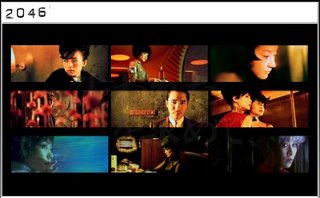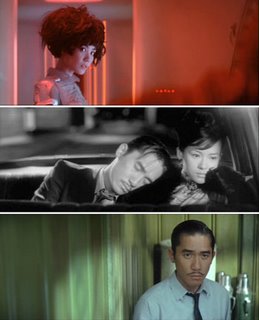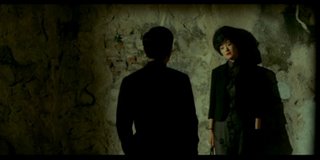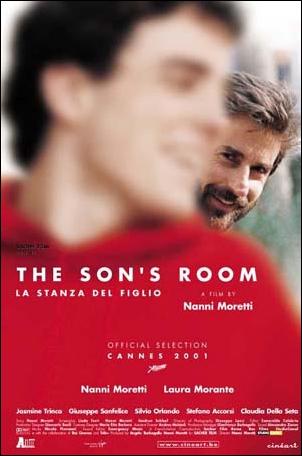2046

Thanks to Alok, on Sunday evening, I saw 2046 on big screen. Although I was tired from two days of night out, I pushed myself to the screening so that I may go though the experience of visual and sound, two things which Wong Kar-wai seems master in fusing so well with each other, and thus creating the often talked about 'mood', which warrant a big screen viewing.
When I saw 2046 for the first time, I approached it with infinitely high hopes and as a continuation to Kar-wai's masterpiece In the Mood for Love. My first expectation was not fully fulfilled but it did wonders in being a continuation to In the Mood for Love. It had similar themes; it had its sublime moments of deep eroticism accentuated by great music and searching visual and most importantly the devastating power of unconsummated smoldering love.
The newspaper man (Chow Mo Wan, Tony Leung Chiu-wai reprises his character from IMFL) of In the Mood for Love has moved to Hong Kong, is writing erotic novels, lives in Hotel Oriental and now having a playboy sort of living, lots of one night stands, but is never able to get over the past. He comes in contact with three women and they are in one way or the other related to his past affair, an affair which is too deeply felt and too brutally truncated that he is not able to make any new connection, any new memories, always traveling on a train to reclaim his past memories, an effort that keeps him away from making new memories. But as the life goes, people come to your lives and the past rumbles up and down, although eventually you are lost in memories which are all about past, recent past and irrecoverable past. This ghost haunts our hero, in the hotel rooms and alleys, in the curves of women, in any contact he wants to make.
The thing that I most adore about Wong Kar-wai is his thin stories and how they come to life with flair and the mastery of cinematic medium. Wong Kar-wai is a master in making references to the past in the ways few can even attempt. The choice of symbols are too elegant, of all bigger things Kar-wai chooses the number of the hotel room to keep as a reference to the lost love. The material things of the consumer world gets the shape of love objects in his hands, whether its the tinned pineapples with a particular expiry date, or a 10 dollar bill paid at every visit to the lover, or the cards that are played between lovers, or the heaps of martial art books that the lovers exchange, or the fishes in a lover's apartment or the place where the lovers meet, the wall behind and the flicking bulb in a romantic rain. These all becomes the portals to the past; something very personal sticks to them. This concept is too thin to make any art out of it, but Kar-wai does it, and that too with such a style which somehow transport you to that lonesome town where all the lovers in Kar-wai movies reside, amidst the blazing neon lights and never stopping and chattering crowds.

2046 has a bigger canvass than In the Mood for Love. The three stories are connected to IMFL beautifully. The story of a prostitute, Bai Ling (Ziyi Zhang), has the connection to the hotel room where the couple stayed in IMFL, The story of Wang Jing Wen (Faye Wong) is related to her common love for Kung-fu novels with the hero, who tried to write such novels with his lover in IMFL. The third story is about a mysterious gambler, Su Li Zhen (Gong Li), who has the same name as Chow's lover in IMFL (Maggie Cheung). And along with all this there is a futuristic tale of a train which people board to regain their lost memories, but they never come out of it. In all this meandering narrative and brilliant visual, Kar-wai tries hard to give his patent mood, mood of loss, mood of sexuality and mood of regret, mood of secrecy, sex and love.
An important quality of his movies is the way he blends music to visual. This mastery is even seen in the title sequence of 2046, as the array of Chinese letters flash and fade on screen, music come and goes, as if assisting their movement, matching their rhythm. I particularly like IMFL for this reason, the audio-visual treat that it offers, without losing the right note to synchronize camera to music, Su Li Zhen's every ascent and decent becomes an act of love, an act of art of love, her curves, looking back at stairs and her wiping off the rain drops from her forehead becomes such a profound experience that remains with you long after she has reached her small room and finished eating the noodles.
2046 lacked such a trance, at least in story of Li Bing, an oh-so-beautiful prostitute, who falls in love for our hero. Wong Kar-wai has a way with actors, which he seemed to have lost in one of the stories in 2046. Xiang Xiyi is so beautiful and I think a good actress too, but I think she didn't realize that in a War-kai movie you don't 'act' but just be. Her story, which is longest of all, has a touch of conventional acting which Kar-wai actors only show when they are in crowd but with their lovers they become all so muted, all too intense. All the talk and all the rough sex in this story can be muted, can be made more painful and so is the emotional/dramatic impart that Li Bing go though when the relationship does not work out. It becomes a sort of melodrama that we don't expect from Kar-wai. In a Kar-wai movie, tears don’t reach the chin, they are wiped out, with ruthless secrecy, on the cheeks itself. Here the tears reach the chin, several times.

I loved the other two stories too much. The one with Faye Wong in love with a Japanese man, learning an alien language, and writing Kung-fu novels, and the painfully sad and deeply sexy story of a gambler, played by Gong Li, who is trapped in her memories, a female version of our hero. Both the actresses in these stories are exceptionally well. Faye Wong as a love-lorn teenager and a loving android, does such a magic that makes her lost Japanese love, ooze out of her emotionless android body. Gong Li gives a very mature performance with little dialogues and an extremely potent gait in the gloom of her hidden loss. After seeing Gong Li as Su Li Zhen, I thought she is even better than Maggie Cheung of IMFL, who missed a string or two in her performance. A small but extremely efficacious role of Su Li Zhen sizzles the screen with a powerful kiss towards the end, with melancholy music, red lipstick smeared out of the lips as if she just allowed herself to be raped by her present lover, with past carefully keeping a dreadful watch, she walking down the stairs like a fallen goddess.
The film also engages in a good old cliché, 'The Lonely Christmas Cliché', which could have been avoided given the past inventions of ennui by Kar-wai, all those beautiful inventions to refer to hole in the hearts of lovers that merge reality to fiction, producing a modern fantasy. There are some minor problems with editing which a casual watcher like me could also point out, but on a second thought I always question myself, was it meant to be like that, especially in case of masters of medium like Kar-wai, who don't care much for schedules or budget. One more problem with 2046 is its dialogues. As is the case with War-kai's stories, they are either so everyday that no mushy flamboyant communication will go with it, or they are so passionately intense that no communication in words is required at all. Characters will talk about ties and purses, but never about love and how they feel about it. 2046 has some notoriously naive dialogues which, at times, makes 2046 looks like a love child of IMFL and a mushy hallmark card.

But I must say, there is no denying the fact that its a potent sequel to In the Mood of Love, it broadens its canvass, it takes further the similar themes adding the sublime theme of regret and it is as beautifully crafted as IMFL. 2046 opens the memories whispered in the tree hole, and we find out that the wound is still bleeding and Kar-wai captures all that gore and dressings with love and understanding. For me, who so loved IMFL, and somehow want to remain in that realm, in that train of past, 2046, with all its flaws, knocks me down at least in parts and will linger for long.
